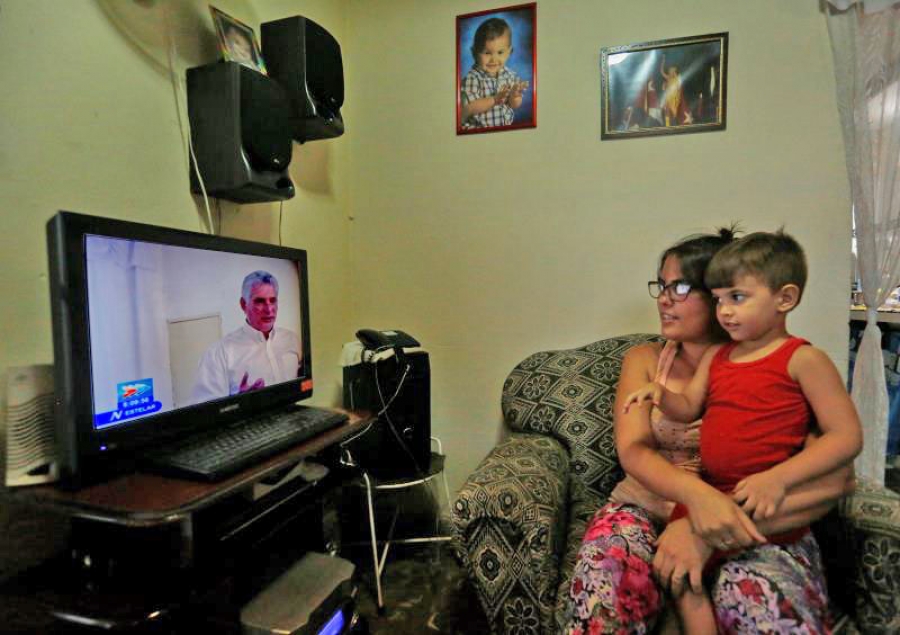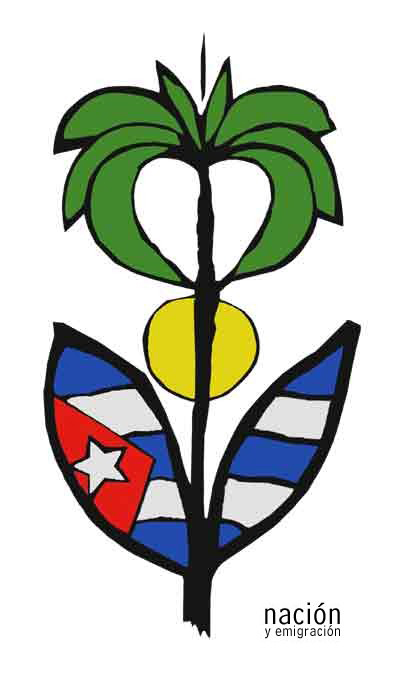The American Blockade On Cuba, Indeed A Mistake
- Detalles
- Publicado: Domingo, 27 October 2019 18:48

Cuban President Miguel Díaz-Canel on national television
I have just received this email in my inbox related to a product I intend to receive in Europe and eventually transport to my family house in Havana:
‘Dear…
‘The very knowledge that we are aware of [the] destination being Cuba disallows us from proceeding further.
‘Any subsidiary company of the US parent company is held to the same rules. So even though your products may come from Picardie (France), they are held to the same standard.
‘Kindly excuse us from quoting.
‘Kind regards
Sales Department
This is the daily reality of the American ‘embargo’1, in place for over fifty years, in spite of attempting against the United Nations Charter and international law.
The United States blockade of Cuba represents the absolute arrogance of a powerful neighbour who intends to decide, by force, what should happen in its supposed zone of influence.
Cubans already suffered the military presence of the Americans on the island, when they intervened at the end of the 19th century in the war of independence, usurped the triumph of the Cuban war heroes against the Spanish metropolis and did not invite them to sign Spain's capitulation act. Later, the Americans established corrupt Republican governments, manipulated from the United States, including the dictatorship of Fulgencio Batista, who took the lives of so many Cubans opposed to his regime. The arrival of Fidel Castro and the young rebels who conquered power in 1959 was the result of a society in need of a drastic change. To adopt socialism as a socio-political system was a decision of the Cuban people and it still is.
Successive U.S. administrations since the triumph of the Cuban Revolution in 1959 have tried, by all possible means, to eliminate the island's political system. The first sanctions against Cuba started in 1960 when president Eisenhower eliminated the Cuban sugar quota, and were expanded by the Kennedy and Johnson administrations ‘with two objectives in mind: to render the Cuban development project unattractive, as an economic model for the Third World, and, optimally, to create economic dislocation, societal conflict, and the regime’s disintegration’ (Morley, 1984).2 Putting pressure on its allies has been part of the strategy, as Morley describes in ‘The United States and the Global Economic Blockade on Cuba’.
Currently, we are witnessing its worst hardening moment. The administration of Donald Trump has decided to suffocate the Cuban people and try to turn the population against their government. Trump’s command is a wide roll back on the strategy of the previous administration of Barack Obama. In April this year, Trump activated Title III of the 1996 Helms-Burton Act, which enables Americans to sue U.S. and international companies profiting from property that was nationalized or confiscated after Cuba’s 1959 Revolution. It has also put a halt to individual “people-to-people” travel. The US Treasury Department is to audit any demand of American citizens willing to travel to Cuba. Transactions with Cuban businesses are restricted and tansactions with any business linked to the Cuban military are banned. This is the case of an estimated of 60% of all Cuban businesses.3 As a result, nearly two hundred Cuban military-run companies and hotels are sanctioned as well as any company or vessel involved with shipping Venezuelan oil to Cuba.
The Cuban President Miguel Díaz-Canel announced on Cuban national television that more difficulties are approaching for the island due to fuel supply disruptions, resulting from US sanctions against Venezuela which is Cuba’s principal oil supplier. Emergency measures were announced by Diaz-Canel, however, he reassured Cubans: ‘we have a strategy to succeed and the Yankee administration will not achieve its aim of disheartening the Cuban people and much less vanquishing it’.
Every year the United Nations General Assembly votes on a resolution to end the United States‑led blockade against Cuba. The recent record remains of 189 in favour to 2 against (Israel and the United States) with no abstentions. By means of this text the United Nations General Assembly reiterates its call for states not to promulgate and apply laws and measures such as the blockade, in accordance with obligations under international law and the Charter of the United Nations, for example, the freedom of trade and navigation, all threatened by the spirit of the blockade. The UN General Assembly also requests that states that have and continue to apply such laws ‘repeal or invalidate them as soon as possible’. It is in this context that in October Cuba will present a draft resolution calling for the end of such policy towards the island. The resolution needs support.
I lived through the worst moments of the economic crisis of the 1990s that became known in Cuba as the 'Special Period’, in the east of Cuba, as a young girl. I suffered from worrying that my mother could fall ill at any moment. So many Cubans suffered by contracting polyneuropathy, which causes damage on peripheral nerves. People would stop being able to walk or become extremely weak due, amongst other causes, to poor nutrition.4 Panic was caused by the disappearance of the European socialist bloc and the effects of the U.S. blockade imposed on Cuba, isolating the island and discouraging other countries from trading with Cubans, under threaten of being fined or punished. Today we fear the consequences of the new sanctions on Cuba.
Sustaining the achievements of the Cuban Revolution and improving them is the right of the Cuban people acting in its absolute sovereignty. The changes that the country may need for a modern Cuban society must come from within.5 Despite the blockade, the government and the Cuban people are continuously fighting to find ways and means to improve their living standards. The United States blockade of Cuba is regrettable and an absolute disregard for international law. As a result, Cubans suffer, but also Americans, as well as the families that we have created around the world. As Cubans we are convinced that our destiny must be decided, exclusively, by us.
From any corner where a Cuban voice can be heard, we demand the end of the blockade and the support of the international community.
Emma Calderin
1. The sanctions of the United States on Cuba transcend the definition of ‘embargo’. Since the intention of the sanctions is to isolate Cuba to cause the surrender of its government, it is more accurate to denominate it ‘blockade’. See: SA- Nacionalizaciones y Bloqueo de la Dra. Olga Miranda Bravo, Editorial de Ciencias Sociales, La Habana, 1996.
2. Morley, M. (1984). The United States and the Global Economic Blockade of Cuba: A Study in Political Pressures on America's Allies. Canadian Journal of Political Science / Revue Canadienne De Science Politique, 17(1), 25-48. Retrieved from www.jstor.org/stable/3227652
4. See www.medicalnewstoday.com/articles/317212.php
5. A major transformation in the country has been the opening to private initiative. It is estimated that at least one million nationals work in the private sector (The Guardian, www.theguardian.com/world/2019/feb/25/cuba-approves-new-socialist-constitution). To adapt the legal framework to these circumstances was a challenge managed by the Cuban government and its people. In 2019 Cubans voted for a new constitution. Cubans discussed amongst other issues: ratifying socialism on the island as irrevocable, as well as legalising economic reforms.






